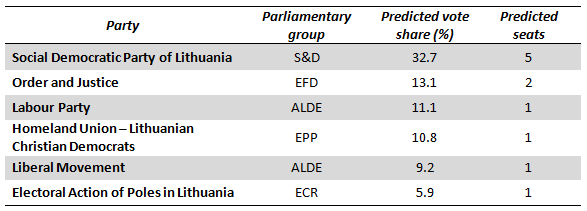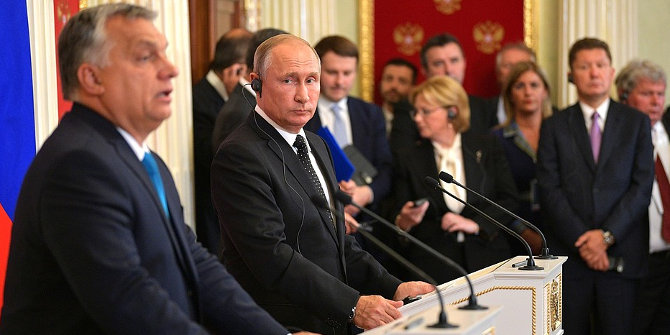 Lithuania will hold the second round of its Presidential election on the same day as European Parliament elections on 25 May. Mažvydas Jastramskis previews both of the elections, noting that the inclusion of the Presidential election is likely to raise turnout from the exceptionally low level experienced in the European elections in 2009 of just over 20 per cent. He writes that while the country has been one of the most pro-European of any state in the EU, plans to join the euro in January 2015 have been less popular. Nevertheless, this ‘anti-euro’ sentiment has not spilled over into genuine Euroscepticism.
Lithuania will hold the second round of its Presidential election on the same day as European Parliament elections on 25 May. Mažvydas Jastramskis previews both of the elections, noting that the inclusion of the Presidential election is likely to raise turnout from the exceptionally low level experienced in the European elections in 2009 of just over 20 per cent. He writes that while the country has been one of the most pro-European of any state in the EU, plans to join the euro in January 2015 have been less popular. Nevertheless, this ‘anti-euro’ sentiment has not spilled over into genuine Euroscepticism.
Lithuanians will vote in European Parliamentary elections on the same day as the country holds its second round run-off vote in the Presidential election. In the first round, which was held on 11 May, the non-aligned incumbent president, Dalia Grybauskaitė, narrowly missed out on winning an absolute majority, although with 45.9 per cent she was well out in front of the other candidates. Her nearest rival was Zigmantas Balčytis, of the Social Democratic Party of Lithuania (LSDP) who won just 13.6 per cent of the vote.
Most importantly, the fact that Lithuanians will also be voting for their next President should raise the turn-out from the meagre level of just under 20.1 per cent who voted in the EU elections in 2009. More than 50 per cent of eligible citizens are expected to cast their votes in both polls this time around.
Lithuania has a “semi-presidential” system whereby the President is the head of state, while legislative power is vested in the Prime Minister, who at present is Algirdas Butkevičius, a member of the LSDP, which is part of the ruling coalition in Lithuania’s parliament or “Seimas”. Competition between two presidential candidates may also influence voting in the European elections. The fight between Balčytis and Grybauskaitė could encourage increased polarisation between the left and the right – Lithuania’s governing coalition and the opposition.
Grybauskaitė presents herself as non-partisan, but she draws a great deal of her support from parties that make up the right-of-centre parliamentary opposition: the Liberal Movement of the Republic of Lithuania (LRLS) and Homeland Union-Lithuanian Christian Democrats (TS-LKD). She is usually portrayed in the media as a right-leaning politician and all of LSDP’s partners in the governing coalition – Order and Justice, the Labour Party, and the Electoral Action of Poles – support Balčytis. Lithuania has 11 seats in the European Parliament and, as the Table below shows, the LSDP is expected to win the majority of them.
Table: Predicted vote share and seats in 2014 Lithuanian European Parliament election

Note: Chart is provided for illustrative purposes and is not an attempt by the author to predict the result. Based on Pollwatch2014 data using opinion polls from 17 April conducted by Splinter. For more information on the parties see: Social Democratic Party of Lithuania; Order and Justice; Labour Party; Homeland Union – Lithuanian Christian Democrats; Liberal Movement; Electoral Action of Poles in Lithuania.
Since the country became a full member of the European Union in 2004, Lithuania has consistently emerged as one of the most positive members in terms of people’s trust in the EU and its institutions. There is no real Eurosceptic party and the issue has remained marginal in political discourse. As the Chart below shows, Lithuania is one of the most optimistic states in terms of the future of the European Union. While trust in the EU has fallen Europe-wide, 52 per cent of Lithuanian respondents also expressed confidence in the EU in a 2013 Eurobarometer survey, placing the country equal third with Malta and Poland.
Chart: Percentage of citizens in EU states who are ‘optimistic’ and ‘pessimistic’ about the future of the European Union (2013)

Source: Eurobarometer
Scepticism about the euro
But while Lithuanians approve of the EU, some aspects of Europe are more popular than others. Only one in ten Lithuanians wants the euro, for example, and as Lithuania approaches its planned date for joining the single currency – January 1 next year – the debate over it is growing gradually more intense.
The Order and Justice party is now demanding a referendum on membership of the euro, while the Electoral Action of Poles in Lithuania, part of the ruling coalition, openly declares that introduction of the euro would not be a good decision at the moment. The performance of these parties in the European Parliament elections will be an indicator of how this issue plays in the minds of the electorate.
If there is Euroscepticism, it is more strongly pronounced among older voters and marginal parties. In the latter half of 2013, two small parties: the Lithuanian Peasant and Greens Union (LVŽS) which has one seat in the Seinas, and the Nationalist union (TS) which doesn’t hold any seats, started collecting signatures in order to prompt a referendum that would prohibit selling Lithuanian land to citizens of foreign countries.
This would put Lithuania at odds with EU law governing land ownership and investment – and the campaign failed to attract support from the major parties. Despite raising the necessary 300,000 signatures, the campaign has not done much to boost the very marginal popularity of Lithuania’s very small Eurosceptic contingent.![]()
Please read our comments policy before commenting.
Note: This article was originally published on The Conversation. Read the original article. Mažvydas Jastramskis receives funding from the Research Council of Lithuania. The article gives the views of the author, and not the position of EUROPP – European Politics and Policy, nor of the London School of Economics.
Shortened URL for this post: http://bit.ly/1m46h6N
_________________________________
 Mažvydas Jastramskis – University of Vilnius
Mažvydas Jastramskis – University of Vilnius
Mažvydas Jastramskis is a Post-doctoral Fellow at the University of Vilnius.





